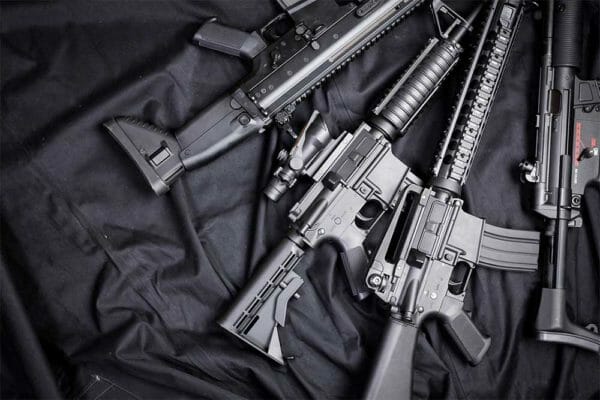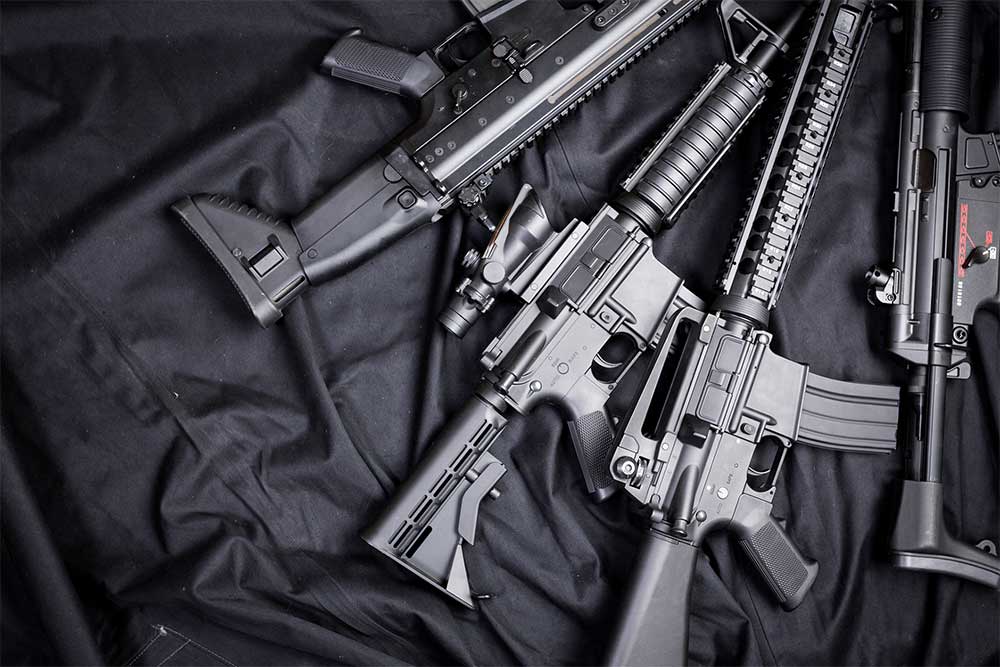
It’s one of the biggest cases to be submitted to the Supreme Court for certiorari (review) in recent memory, for the third time, and if the high court takes it, the ruling is likely to have a shattering effect on the gun control crusade, and even the Wall Street Journal is acknowledging that much in a Monday morning article.
But the “if” in this story underscores why the word, itself, is the biggest word in the English language. The time for hearing such a case is long overdue, say grassroots gun rights activists.
It would be the second time the court considers the case known as Bianchi v. Frosh. When the court last had this challenge of the Maryland ban on so-called “assault weapons “ before it back in 2022, it chose to vacate the Fourth Circuit Court of Appeals decision, and remanded it back down to the lower court for further consideration under the new guidelines which had just been established in New York State Rifle & Pistol Association v. Bruen, the celebrated ruling which tossed the “two-step” process for considering Second Amendment cases.
Among the plaintiffs are two heavy-hitters in the gun rights movement, the Second Amendment Foundation and Citizens Committee for the Right to Keep and Bear Arms. They were joined by the Firearms Policy Coalition, Field Traders LLC, and private citizens including Dominic Bianchi, for whom the case is named.
To consider what is at stake requires a look at not only the politics surrounding the Second Amendment debate, but also the prejudices involved and perhaps the biggest hypocrisy of the gun prohibition movement. This might be best explained by a passage in an Op-Ed in The Quint by Murali Kamma, who refers to a recent book on the “gun culture” by Dominic Erdozain, described as a “research fellow at Emory University in Atlanta.”
Kamma writes: “In his book, Erdozain gives readers a compelling explanation of the Second Amendment and the distortions that followed, and he argues how the nation’s founders never intended it to guarantee an individual right to bear arms. In fact, the word ‘individual’ doesn’t appear anywhere in the amendment, but the crucial words that do appear are ‘well-regulated militia,’ which had become important for the founders who were wary of having a permanent military on these shores.”
Herein lies the credibility problem for the gun control crowd: On one hand, they insist the Second Amendment only applies to the militia, while on the other hand, they argue the amendment does not protect the very weapons which militia service requires.
For his part, Kamma—a “writer and managing editor of Khabar, a monthly magazine catering to the Indian-American community in the Southeast”—makes this questionable observation: “Far from protecting the owners, firearms promote vigilantism, and they pose the most danger to family members.”
Back to the WSJ article, the newspaper notes, “Nine Democratic states and Washington, D.C., have restrictions on the purchase or possession of AR-15 rifles and other firearms labeled assault weapons.”
Right, it is only in Democrat-controlled states where such firearms are restricted or outright banned, although this hasn’t prevented criminals and crazed killers from having them.
While the gun control crowd either will not admit it, or they simply don’t believe it, only the law-abiding citizen is penalized by restrictive gun control laws, which is why SAF, CCRKBA and FPC have pursued this challenge with such vigor. These organizations know the difference between good guys and bad guys.
In their petition for certiorari, which was submitted to the Supreme Court earlier this month, attorneys representing the gun rights organizations write, “From the founding of this country, the rifle has been a paradigmatic American arm, facilitating the struggle for independence from the British and serving as ‘the companion’ and ‘tutelary protector’ of the westward pioneers…The modern iteration of this paradigmatic arm is the AR-15 platform rifle, a semiautomatic firearm that is popular for self-defense, hunting, range training, and as a bulwark of liberty, due to its accuracy, ease of use, and ergonomic design. Indeed, AR-15s and other semiautomatic rifles are the best-selling rifles in the country. They are owned by millions of Americans and have accounted for approximately 20% of all firearm sales in the country for over a decade.
“And yet,” they continue, “a majority of the Fourth Circuit sitting en banc held that the AR-15 is not even an ‘arm’ within the meaning of the Second Amendment, because, in its view, the AR-15 is too like fully automatic M16 rifles and other ‘military weapons.’ That reasoning unfortunately is becoming a commonplace misapplication of this Court’s precedents.”
Should the Supreme Court take this case, one might draw a few conclusions or at least presumptions.
- The Court is not likely to take a case simply to affirm the status quo, which means something earth-shaking could be on the horizon for gun banners, including Washington Attorney General Bob Ferguson, now running to become the state’s next governor, who has repeatedly bragged he has not lost a case to the gun lobby. He supported legislation banning so-called “assault weapons” in Washington state, and a high court ruling that these guns are protected by the Constitution would be a significant loss, for him and billionaire-backed gun prohibition groups including Everytown for Gun Safety and the Alliance for Gun Responsibility.
- It would open the floodgates for lawsuits challenging state bans in California, Illinois, Connecticut, New Jersey and elsewhere, and those bans would almost certainly be thrown out on constitutional grounds.
It all depends upon whether the Supremes take the case. And this is the biggest “if” which is keeping people on both sides of the gun control debate on then edges of their seats.
About Dave Workman







If it gets to the SCotUS, the legality of the process (not just if it’s still good law or not, but the actions of Ragon and Black themselves) in Miller must, explicitly, be challenged.
Who are the militia? Are they not ourselves? Is it feared, then, that we shall turn our arms each man gainst his own bosom. Congress have no power to disarm the militia. Their swords, and every other terrible implement of the soldier, are the birthright of an Americans.
Tench Coxe– American political economist and a delegate for Pennsylvania to the Continental Congress in 1788–1789
Important as this case is, even if SCOTUS says that all arms are categorically protected – the oppressors will find other ways to attack our rights. Maryland court erroneously ruled that magazine limits are constitutional – so expect ever shrinking limits on magazine size. Expect ever more stringent limits on ammo purchase and possession. Expect longer purchase delays, shipping restrictions, purchase and possession limits (see California one every 30 days rule). Each of their efforts will need to be fought separately and will remain a threat until clearly denied by SCOTUS. Even then, anti-rights politicians have already demonstrated that they… Read more »
The SCOTUS has ducked the zSecond Amendment question for 230 years. Even after the Civil War gun laws were based on skin color and religion. The SCOTUS had the same Justices from Virginia, zone Maryland and Delawarw. In the 1939 SMALLER case the Court didnt now that shortarrel shotguns were used in trench warfare in WWI. Scotus options are routinely ignored by lower judges and magistraights. Scotus has the power to dissipine judges but the don’t. Congress can impeach but they only threaten conservatives. The USA was lucky in WWII becajse 3000 miles of ocean gave time to build and… Read more »
“To consider what is at stake” , it’s not just the “gun control crowd” who face “something earth-shaking.” Both sides have put all of their chips on the table and the 2A (eff you FBI with your MVE list) crowd could also get the biggest setback to individual right and liberty in 233 years. I don’t think that will be the result but it is a risk. In fact I am doubtful that we will get full throat-ed slap-down the gun prohibitionists deserve and the complete protections we deserve. Fingers crossed and breath held that we do better than that.
Why do cases exactly like this one just keep recycling back to SCOTUS?
Was Kamma the dude who created the tin sign depicting a band of American Indians on horseback, captioned…”Turn your guns in. The government will take care of you.” Yeah, like they took care of Brian Malinowski, introducing the term “Little Rockin’ ” into the American lexicon. “If the government says “you don’t need a gun,” YOU NEED A GUN!!” How does one know if one needs an AR-15? When the government says “You don’t need an AR-15.” How does one know one needs a F-15 and nukes? When the American President says… “….you’d need a F15 and nukes.” Remember those… Read more »